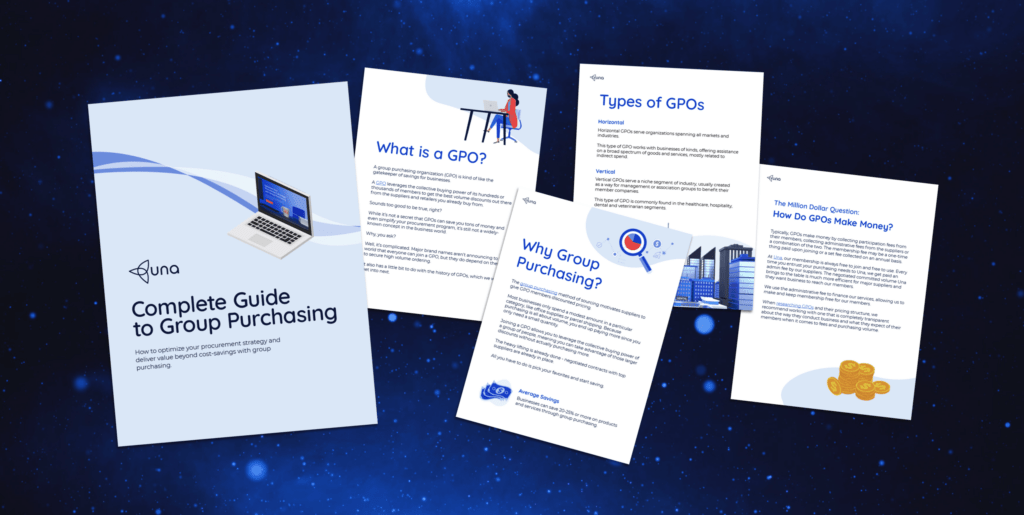What Businesses Need to Know About Indirect Spend
By Anna Duin | August 08, 2018
No matter how big or small your business is, you have to be proactive and strategic about your business indirect spend. Left unchecked, indirect (or “unplanned spend”) can quickly become a formidable obstacle.
In this video, group purchasing expert and Una CEO Anthony Clervi shares the one thing all businesses should know about their indirect spend. He also addresses the common mistakes to avoid, and questions you should ask your team. It’s five minutes worth of hard-won insights.
Don’t have time for a video? Keep reading for the key takeaways.
The Most Important Thing You Should Know About Business Indirect Spend
- Be proactive, don’t wait for a crisis
- Start with the Pareto principle – what can you do that will impact 80% of your spend?
- Identify your greatest areas of indirect spend. Is it parcel shipping, hotels and travel rates, or office supplies?
Common, Unplanned Spend Mistakes
- Being reactive and not taking the time to be strategic
- Not thinking outside-the-box
- Trying to keep everything in-house, missing out on key partners like GPOs
- Boiling the ocean, doing a little here and there, but not moving the needle
Questions to Ask Tour Team
- What are we doing now to manage our indirect spend?
- What data can we review?
- What is the ROI of our current efforts?
- Do we have decentralized purchasing?
- Do we have any category management?
- Are we getting everything we need from our distributors and manufacturers?
- Do we need to increase our buying power?
- What are our goals?
- What outside resources could we leverage?
- What small changes could we make that would have a significant impact?
Indirect Procurement Strategy
When looking at your expenses, you can separate your costs into two buckets. The first would be everything it takes to keep the day-to-day business alive, such as the bills, kitchen supplies, cleaning supplies, etc. The second bucket is what’s required to produce the goods, like purchasing ingredients in bulk from a third party. While you often can’t control third-party prices, you can still have a say in your indirect spend.
The same principles apply to any business where you have direct and indirect spend. Indirect spending is the act of purchasing services or supplies required to keep the day-to-day business alive, while direct spending refers to the third party that is meant for production of the organization’s products and or services.
Whether you are a large or small business, you have indirect spending needs, and we have a strategy that will save you money on what you’re currently buying.
Challenges for Independent Companies
The problem with indirect spending is that although the needs are consistent, the means by which you procure them vary. Here are a few of the challenges that stand in a company’s way of getting the lowest pricing available for their day-to-day needs.
- A smaller-than-average spend: Purchasing volume for a small to mid-sized company can be lower, meaning the procurement lacks leverage in the negotiation process with vendors.
- Lower relational capacity: Building fruitful relationships with a large number of big suppliers is a time drain for companies that have limited resources.
- Difficult to evaluate: Indirect spend often cannot be anticipated or captured, making it hard, if not impossible, to account for and accurately budget.
Indirect Procurement Strategy Solutions
Entering into a procurement partnership with a group purchasing organization transfers these issues to a party with not only expanded capacity and connections but expertise in collective buying. A GPO has pre-existing relationships and programs with suppliers in place to not only save you money but the time that would be spent trying to negotiate on behalf of your company.
By taking your purchasing needs for day-to-day operations and combining them with the purchasing orders of thousands of other companies, GPOs like Una can secure negotiated discounts with the top suppliers in the country. Approaching vendors with a high committed volume allows us to offer you the lowest available pricing on top quality contracts.
Una works with trusted suppliers and we have contracts that are amongst the highest-ranked in the country in both quality and price. Our supplier marketplace includes vendors such as Office Depot, FedEx, US Foods, and more. Check out all our incredible vendors to see the breadth of our available programs and how they could benefit you.




